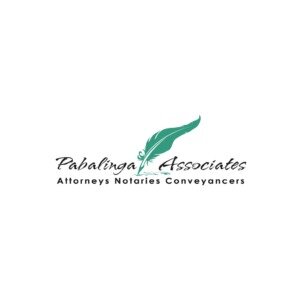Best White Collar Crime Lawyers in Francistown
Share your needs with us, get contacted by law firms.
Free. Takes 2 min.
List of the best lawyers in Francistown, Botswana
About White Collar Crime Law in Francistown, Botswana
White Collar Crime in Francistown, Botswana, involves non-violent crimes that typically occur in commercial settings and are motivated by financial gain. These crimes include fraud, embezzlement, bribery, insider trading, and identity theft. White Collar Crime is regulated under Botswana’s Penal Code and related legislations, aiming to protect public funds, private industries, and the financial integrity of transactions conducted within and outside the country. The Botswana government has committed to strengthening legislation and financial systems to combat these crimes effectively.
Why You May Need a Lawyer
If you are involved in any situation relating to White Collar Crime, it is essential to seek legal counsel. Common scenarios include facing charges of fraud or embezzlement, being a victim of commercial crime, or needing representation during an investigation. A lawyer can help you navigate complex legal procedures, provide defense strategies, negotiate settlements, and ensure your rights are protected throughout the legal process.
Local Laws Overview
In Botswana, White Collar Crime laws are primarily covered under the Penal Code, the Anti-Money Laundering and Combatting the Financing of Terrorism Act, and the Corruption and Economic Crime Act. Key regulations include strict penalties for fraud, detailed procedures for financial crime investigations, and requirements for companies to implement anti-corruption measures. The Directorate on Corruption and Economic Crime (DCEC) plays a pivotal role in investigating and enforcing these laws, ensuring that ethical standards are upheld in both public and private sectors.
Frequently Asked Questions
What constitutes White Collar Crime in Botswana?
White Collar Crime typically encompasses offenses such as fraud, bribery, insider trading, embezzlement, and money laundering, characterized by deceit and motivated by financial gain.
What should I do if I’m accused of a White Collar Crime?
If you are accused, it is crucial to seek legal counsel immediately. A lawyer will guide you through the legal process, help you understand the charges, and represent you during investigations and court proceedings.
What are the penalties for White Collar Crimes in Francistown?
Penalties can vary based on the severity of the crime and include fines, restitution, and imprisonment. The laws are designed to be robust to deter economic offenses.
Can businesses be penalized for White Collar Crimes?
Yes, businesses can face serious consequences, including significant fines, sanctions, and reputational damage, if involved in economic crimes.
What role does the Directorate on Corruption and Economic Crime (DCEC) play?
The DCEC is responsible for investigating corrupt practices and economic crimes. They function to prevent, educate, and enforce laws against White Collar Crimes in Botswana.
How can I identify fraudulent activities in my business?
Regular audits, employee training on risk management, and implementing strict financial controls are effective ways to detect and prevent fraudulent activities.
What resources are available for victims of White Collar Crime?
Victims can seek legal support through private attorneys or assistance from the DCEC, which may offer guidance and support with investigations.
How does the law protect whistleblowers in Botswana?
Botswana law provides certain protections to whistleblowers to encourage the reporting of corruption and economic crimes without fear of retaliation.
Is international cooperation necessary in prosecuting White Collar Crimes?
Yes, given the global nature of many of these crimes, Botswana often cooperates with international bodies to effectively investigate and prosecute offenders.
Are court proceedings for White Collar Crimes public in Botswana?
Generally, legal proceedings are public to ensure transparency, but certain aspects may be held in confidence to protect sensitive information.
Additional Resources
Some key resources include the Directorate on Corruption and Economic Crime (DCEC), legal aid services, and the Botswana Law Society. These organizations offer guidance, support, and representation for those involved in White Collar Crime cases.
Next Steps
If you find yourself in need of legal assistance regarding White Collar Crime, the first step is to consult with a legal professional who specializes in this area. You can contact the Botswana Law Society for referrals or reach out to a law firm in Francistown familiar with financial crime cases. It’s vital to act promptly to ensure the protection of your legal rights and interests.
Lawzana helps you find the best lawyers and law firms in Francistown through a curated and pre-screened list of qualified legal professionals. Our platform offers rankings and detailed profiles of attorneys and law firms, allowing you to compare based on practice areas, including White Collar Crime, experience, and client feedback.
Each profile includes a description of the firm's areas of practice, client reviews, team members and partners, year of establishment, spoken languages, office locations, contact information, social media presence, and any published articles or resources. Most firms on our platform speak English and are experienced in both local and international legal matters.
Get a quote from top-rated law firms in Francistown, Botswana — quickly, securely, and without unnecessary hassle.
Disclaimer:
The information provided on this page is for general informational purposes only and does not constitute legal advice. While we strive to ensure the accuracy and relevance of the content, legal information may change over time, and interpretations of the law can vary. You should always consult with a qualified legal professional for advice specific to your situation.
We disclaim all liability for actions taken or not taken based on the content of this page. If you believe any information is incorrect or outdated, please contact us, and we will review and update it where appropriate.








